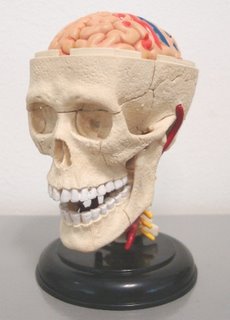 You know, sometimes when I am too demoralized to get out of bed in the morning, I like to play this little game.
You know, sometimes when I am too demoralized to get out of bed in the morning, I like to play this little game.I'll blink each of my eyes in turn to locate where the blind spots are in my visual field.
You can try this too - all you need is a plain, light-coloured background (such as a ceiling) to stare at.
The blind spots appear as a round, slightly dim patch near the centre of vision: left-of-centre (approx. 10 degrees of arc) in the left eye and right-of-centre in the right eye.
Once I find the blind spot in one eye, I will close the other eye and then raise a hand to try use my blind spot to "see" my fingertip.
As I move my fingertip into the visual area covered by the blind spot, it disappears.
A tip-less finger!
That's not so surprising - since there are no light receptors at the blind spot, no visual information is sent from the eye to the brain.
The weird thing is that the blind spot doesn't appear black.
It always takes the colour of the background - if the ceiling is yellow, the blind spot appears yellow too.
The brain is responsible for this effect.
In fact, even if the background is some complex pattern, the brain can still "fill in" the complex pattern over the blind spot!
Not convinced? Check out this flash applet and try it for yourself.
The blind spot has always fascinated me: how we can somehow "see" that we can't see.
Even more amazingly, we can also "know" that we don't know!
Like when you try to recall the name of someone familiar, but just can't quite remember it? You are pretty sure that you have that memory somewhere, but yet you can't access it.
Psychologists studying this phenomenon, known as the "tip of the tongue" state, have uncovered many surprising insights into the mechanism of human memory.
It turns out that information storage and recall are actually two distinct processes. In addition, the storage of what we consider as one set of information is really fragmented into many different locations in the brain.
Memory recall is highly dependent on the connectivity between these brain regions.
Here's an excellent article in the Boston Globe that describes the details of this strange effect:
The messy reality of the mind contradicts the conventional metaphor of memory, which assumes that the brain is like a vast and well-organized file cabinet. According to this theory, we're able to locate the necessary memory because it has been sorted according to some logical system. But this metaphor is misleading. The brain isn't an immaculate file cabinet - it's more like an untidy desk covered with piles of paper.

People with certain brain injuries can suffer from a permanent form of the "tip of the tongue" state, such that they can remember almost everything about a person - except for her name.
Hey, that sounds extremely familiar!
It's like an endeavour where scores of idealistic, hapless young turks spend years of fruitless labour on the verge of a huge breakthrough discovery, but never quite getting there.
I can't remember the name of that field.
Pipette tip to Mind Hacks.






3 Comments:
I read that we actually cannot remember everything, so our brain actually fills up the missing information with its own made-up information.
Otherwise how to get so much info into our limited-size brain?
FBS
To FBS:
Yes, the brain has peculiar pattern forming and predictive functions that are sometimes not rooted in physical reality. Our memories of events can even be changed depending on how the question is asked.
Neuroscience research is revealing just how weird and wonderful the human mind is.
My personal experiences with deja vu also never cease to amaze me. Perhaps you might do an article on that in future.
FBS
Post a Comment